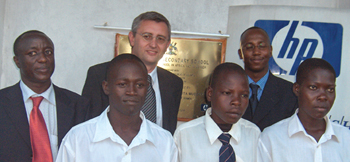Hewlett Packard is a long-time investor in emerging markets. The technology company’s strategy of expansion into developing economies has proved an effective way of using global growth markets to balance stagnating US and western European sales.
Only a third of Hewlett Packard’s global revenues originate from the US, which is one reason why the company was not affected by the recent financial crisis, says HP Africa managing director Rainer Koch.
Advertisement
Meeting of minds: Mr Koch (centre) meets pupils at Bugulumbya secondary school in Uganda
“We were first to explore the emerging markets of eastern Europe 15 years ago, and now that the region is reaching a slower sales period we are looking at the next wave of investment, which includes Africa,” he explains.
Africa’s growth rates of 35% to 40% and the emergence of a middle-class consumer market over the past two years are the main reasons for HP’s interest in the continent, says Mr Koch.
“Africa used to be a pure product market for basic IT equipment, but since 2000, the introduction of mobile communications and banking privatisation has prompted a tremendous growth in the demand for complex IT infrastructure environments,” he says.
Technical labour
Advertisement
HP has made significant investments over the past year to support the delivery of technical and consulting services for its African businesses. The continent’s language skills make it an ideal location for call centres such as the one HP opened in Tunisia in 2007, providing support for French speakers in Europe. The company is actively looking in east Africa for a location in which to base a similar English-speaking shared services centre.
But the expansion is not without its challenges: availability of skilled labour and network bandwidth are both limiting factors.
“We have qualified sales office staff, but because the market is still quite small, skilled technical labour is expensive and we are missing that broad mass of qualified people – which India has, for example – for the people-intensive shared services business,” he says.
Africa has a population of 900 million and a significant English and French-speaking population. Forward-thinking African governments are looking at training and education to harness the workforce opportunity, says Mr Koch.
“The IT industry has relatively low environmental hazards and can be fairly quickly introduced,” he says. “It is ideal for Africa, especially as other emerging markets such as India are becoming less competitive, with skyrocketing salaries. Even they are starting to sub-contract work to Africa.”
Progressive African governments are also implementing e-government strategies in collaboration with the World Bank. HP implemented a World Bank-funded project in Uganda two years ago to achieve greater transparency of budgeting processes through automation, which in turn gave foreign investors and funding agencies more confidence in the market.
Ghana, too, is about to go out to tender for a project to modernise its IT infrastructure to capture tax revenues. The project will be partially funded by the World Bank, but will also be a public/private partnership. Mr Koch believes it will be one of many more public sector IT infrastructure improvements throughout Africa.
COMPANY PROFILE HEWLETT PACKARD
Founded:
1939Headquarters: Palo Alto, CaliforniaRevenue: $107.7bn for four quarters ending January 31, 20082007 Fortune 500 Ranking: 14
